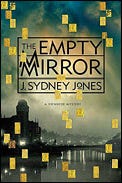The Empty Mirror, the first in a new mystery series set in fin de siécle Vienna, features a fictional lawyer anchoring a cast laced with historical figures. Karl Werthen, a Jew raised as a Protestant in his upwardly striving family, still bristles at the pervasive anti-Semitism in Austria. The brilliant criminologist Hanns Gross is among those who make him bristle. The historical Gross pioneered the use of scientific methods in investigating crimes. In the novel, he waxes indignant about Arthur Conan Doyle, telling Werthen that he "insists on using my methods for his main character - this Holmes fellow. . . . Makes a complete laughingstock of me among my fellow professionals."
Werthen gave up criminal law after the death of a sweetheart who urged him to go into the more financially stable field of wills and trusts. When Gross, an old acquaintance, visits Vienna, it stirs up Werthen's longing for his more exciting former specialty. So when the eccentric artist Gustav Klimt asks Werthen to establish his innocence in a case of murder, he can't resist. One of Klimt's models has been the victim of a serial killer. Klimt - scandalous and feckless, but no killer - is the target of the police investigation. Werthen enlists Gross's assistance in finding the real killer. The self-absorbed Gross is all too eager to help, and the hunt is on.
Meanwhile, Empress Elizabeth of Austria is murdered in Geneva, which calls forth memories of the death of her son, Crown Prince Rudolf, nine years earlier at his Mayerling hunting lodge in an apparent suicide pact with his mistress. Readers familiar with the mystery genre will guess that these historical deaths will sooner or later become linked to the fictional murders. The Empty Mirror offers many clever twists. A lag in the mystery’s pace in the middle of the story is satisfyingly filled by Werthen's first meeting with the woman who will become the love of his life. (2009; 310 pages)





I'm ordering this book right away!
It's a good one!